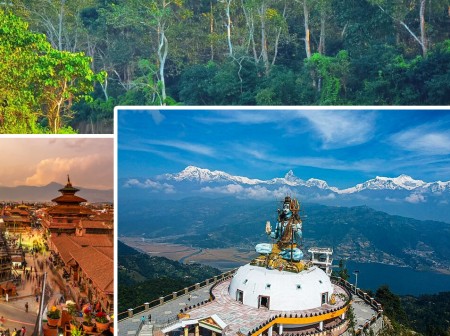
Can Beginners Do the Everest Base Camp Trek?
- soleencounters
The Everest Base Camp Trek is often seen as a once-in-a-lifetime adventure—but for many beginners, it may also seem out of reach. With towering peaks, high altitudes, and remote trails, the question arises: Can beginners really do the Everest Base Camp Trek?
Table of Contents
The short answer is yes—but it requires preparation, the right mindset, and support from experienced professionals. At Sole Encounters Trekking Pvt. Ltd., we’ve guided hundreds of first-time trekkers to Everest Base Camp with great success. In this guide, we reveal what beginners can expect and how to prepare for a successful trek.
Is Everest Base Camp Trek Suitable for Beginners?
Yes, the Everest Base Camp Trek is achievable for beginners with a moderate level of fitness and the right preparation. While it’s a physically demanding trek, it doesn’t require technical climbing skills or mountaineering experience.
Many first-time trekkers complete the EBC trek each year, guided by local experts and a well-paced itinerary. That said, understanding the challenges of altitude, terrain, and weather is essential to set the right expectations.
Explore our Everest Base Camp Trek package to see how we support beginners on this iconic journey.
Challenges Beginners Should Know
1. Altitude
The biggest challenge is altitude sickness, not the terrain. The trek reaches 5,364 meters (17,598 ft) at Everest Base Camp and 5,545 meters (18,192 ft) at Kala Patthar.
Common symptoms of altitude sickness include:
-
Headache
-
Nausea
-
Fatigue
-
Shortness of breath
However, with a well-designed itinerary that includes acclimatization days and gradual elevation gain, most trekkers adjust safely. Learn more in our guide: What Altitude Sickness Feels Like on the Everest Base Camp Trek
2. Fitness
You don’t need to be an athlete—but some level of cardiovascular fitness and endurance is necessary. You’ll be hiking 5–7 hours daily for about two weeks. A few months of preparation goes a long way.
We recommend:
-
Regular walks or hikes (with a backpack)
-
Cardiovascular workouts (jogging, cycling, stair climbing)
-
Core and leg strength training
3. Remote Terrain
The EBC route doesn’t include technical sections, but the trails can be rocky, uneven, and occasionally steep. It’s a non-technical trek—but long and sustained.
There’s no vehicle access after Lukla, and facilities grow more basic as you climb higher. A good mental attitude is as important as physical strength.
Why Many Beginners Succeed
Despite the challenges, many beginners succeed on the Everest Base Camp Trek. Here’s why:
-
Guided treks provide professional support, pacing, and health monitoring
-
Porters carry most of your gear, reducing the physical burden
-
Acclimatization days help your body adjust to the altitude
-
Well-established teahouses offer basic comforts and meals along the route
-
The motivation of standing at the base of Mount Everest fuels determination
With expert guidance from our Everest Region specialists, even novice trekkers can reach their goal confidently.
Everest Base Camp Trek Itinerary for Beginners
We recommend the 15-day Everest Base Camp itinerary, which includes:
-
Extra days for acclimatization
-
A comfortable pace
-
Time to enjoy local culture
Typical Route Overview:
-
Day 1–3: Kathmandu to Lukla, trek to Namche Bazaar
-
Day 4–5: Acclimatization in Namche, optional hikes
-
Day 6–9: Trek through Tengboche, Dingboche, Lobuche
-
Day 10–11: Reach Everest Base Camp and climb Kala Patthar
-
Day 12–15: Return to Lukla and fly back to Kathmandu
Every step is guided by local professionals who monitor your health and help you adapt to altitude safely. Talk to our experts for customized itineraries.
Tips for First-Time Trekkers
If you're a beginner preparing for the Everest Base Camp Trek, follow these proven tips:
1. Start Training Early
Train at least 8–12 weeks before your departure. Focus on endurance, core strength, and long-distance walking.
2. Choose the Right Season
The best time to trek is during:
-
Spring (March to May): Clear skies, warmer temperatures, and rhododendron blooms.
-
Autumn (September to November): Best visibility and stable weather.
Avoid the monsoon and winter months unless you're well-prepared for extreme conditions. Learn more in our blog: Everest Base Camp Trek in Different Seasons
3. Pack Smart
Invest in quality gear—warm clothing, moisture-wicking layers, and sturdy hiking boots. See our detailed Packing List for Everest Base Camp to avoid missing essentials.
4. Stay Hydrated and Eat Well
At altitude, dehydration and lack of energy can increase fatigue and altitude-related symptoms. Drink 3–4 liters of water daily and eat high-carb meals regularly.
5. Trek with a Licensed Guide
A professional guide ensures safety, efficient pacing, and insight into the local culture. All treks with Sole Encounters include certified guides, porters, and support staff.
What Makes Everest Base Camp a Beginner-Friendly Adventure
-
No technical climbing required
-
Gradual elevation gain
-
Scenic variety—from pine forests to glaciers
-
Cultural immersion with Sherpa villages and monasteries
-
Experienced guides and porters provided on all our treks
With proper pacing and preparation, the Everest Base Camp Trek is one of the most accessible high-altitude treks in the world for beginners.
Alternative Options for Nervous Beginners
Not sure you're ready for EBC yet? Try these shorter or lower-altitude treks first:
-
Ghorepani Poon Hill Trek: 5–6 days, panoramic Annapurna views
-
Langtang Valley Trek: Moderate trek near Kathmandu
-
Everest View Trek: Shortened version of EBC without high-altitude risk
Explore all beginner-friendly treks on our Trekking in Nepal section.
Conclusion: Yes, Beginners Can Do the Everest Base Camp Trek
The Everest Base Camp Trek is achievable for beginners who are reasonably fit, mentally prepared, and committed to proper training. You don’t need to be a mountaineer to stand at the base of the world’s highest mountain—you just need the right support and preparation.
At Sole Encounters Trekking Pvt. Ltd., we specialize in helping first-time trekkers accomplish this dream. Our itineraries are tailored with acclimatization, experienced guides, and personalized care.
✅ Explore the Everest Base Camp Trek
📩 Contact Us for planning help
📞 Talk to an expert to discuss your trek as a beginner
Recent Posts
.jpg)
3rd Jul, 2025
.jpg)
4th Jul, 2025
.jpg)
4th Jul, 2025
.jpg)
7th Jul, 2025
.jpg)
8th Jul, 2025
.jpg)
8th Jul, 2025
.jpg)
8th Jul, 2025

10th Jul, 2025








